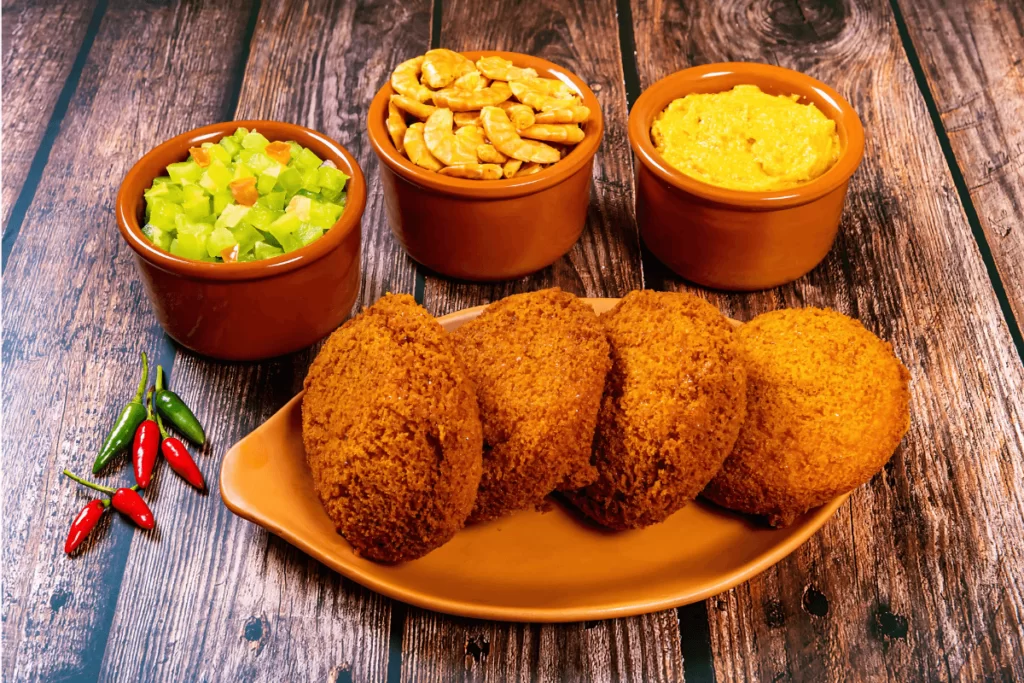Acarajé: A Taste of Bahia You Can’t Miss
Acarajé is definitely one of the most iconic and delicious dishes in Brazilian cuisine. If you ask any Brazilian what acarajé is, the answer will almost always be the same: “It is a deep-fried ball made from black-eyed peas, filled with vatapá, caruru, shrimp, and amazing seasonings.” And yes, it is as tasty as it sounds, if not even better.
The History of Acarajé
Originating in Bahia, acarajé has a rich history full of African influences. It is a culinary legacy from African slaves who arrived in Brazil, bringing their traditional recipes with them. The name “acarajé” comes from the Yoruba words “akara” meaning little cake and “je” meaning to fry. This history shows that acarajé is a centuries-old dish, connecting people to the traditions of the past while remaining a central part of Bahia’s culinary culture today.
Why Acarajé is So Famous
What makes acarajé famous in Brazil goes beyond taste. It carries the essence of Bahian culture and Afro-Brazilian cuisine. In Salvador, you will find acarajé stalls all over the city. The “baianas,” traditional women dressed in white with turbans, prepare each dish with care and attention. They are the guardians of this tradition, serving a dish that embodies flavor, culture, and warmth.
The Flavor Experience
The flavor of acarajé is truly unique. The crunchy exterior and soft interior, combined with creamy vatapá and caruru filling, spiced with pepper and topped with shrimp, creates an explosion of flavors. Each baiana has her own special recipe, making every acarajé a one-of-a-kind experience. For those who enjoy spice, some versions can be hot, adding even more excitement to the tasting experience.
Tips for Trying Acarajé
- Start mild: If you do not like very spicy food, ask for a milder version. Some baianas prepare it with extra pepper that can be intense.
- Try different stalls: Each baiana has a unique recipe, so sampling from multiple stalls is a great way to discover variations.
- Pair with local drinks: Coconut water or fresh fruit juices balance the flavors perfectly.
- Visit during cultural events: Festivals, markets, and Carnival are ideal times to try acarajé and experience local traditions.
- Respect local customs: Acarajé is more than food; it is a cultural symbol. Engage with the baianas politely and enjoy the storytelling that comes with each serving.
Visiting Salvador as a Senior Traveler
Salvador is a vibrant city full of history, culture, and culinary delights. For senior travelers, it offers safe and accessible ways to explore while enjoying traditional dishes like acarajé. Comfortable walking tours, guided visits, and senior-friendly restaurants make the experience enjoyable and stress-free.
Upper City (Cidade Alta) Highlights
- Pelourinho: Walk through the historic center with colorful colonial buildings, cultural centers, and street performers.
- São Francisco Church: Famous for intricate baroque architecture and gold-plated interiors.
- Panoramic viewpoints: Perfect for photography and enjoying city vistas.
- Cafes and resting spots: Take breaks while exploring the charming streets, ideal for senior travelers.
Lower City (Cidade Baixa) Highlights
- Mercado Modelo: Explore local handicrafts, souvenirs, and food stalls.
- Waterfront promenade: Enjoy a leisurely stroll along the bay with beautiful views.
- Family-run restaurants: Sample authentic feijoada, acarajé, and other Bahian dishes.
- Lacerda Elevator: Convenient access between Upper and Lower City. Learn more here.
- Farol da Barra: Iconic lighthouse with spectacular views of the Atlantic.
Top Places to Try Acarajé in Salvador
- Acarajé da Cira: Famous stall in Pelourinho known for authentic recipes.
- Casa de Acarajé Dinha: Family-run, offers traditional and spicy variations.
- Mercado Modelo food stalls: Convenient location to try multiple dishes, including acarajé.
- Acarajé da Baiana do Acarajé: A classic spot to experience culture, flavor, and local hospitality.
- Street vendors in Rio Vermelho: Popular area with lively atmosphere and traditional street food.
Senior-Friendly Tips for Salvador
- Wear comfortable shoes for cobblestone streets.
- Use shaded walking areas and stay hydrated.
- Consider guided tours for safety and cultural insight.
- Take breaks at cafes and viewpoints to enjoy city scenery.
- Plan visits to avoid peak crowds and extreme heat.
Final Thoughts
Acarajé is more than just food. It is a culinary experience, a cultural journey, and a way to connect with Bahia’s rich history. For senior travelers, Salvador offers an accessible and enjoyable environment to explore while savoring the flavors of the city. Enjoy acarajé slowly, visit historic streets, markets, and landmarks like the Lacerda Elevator, and immerse yourself in the heart of Bahian culture.

